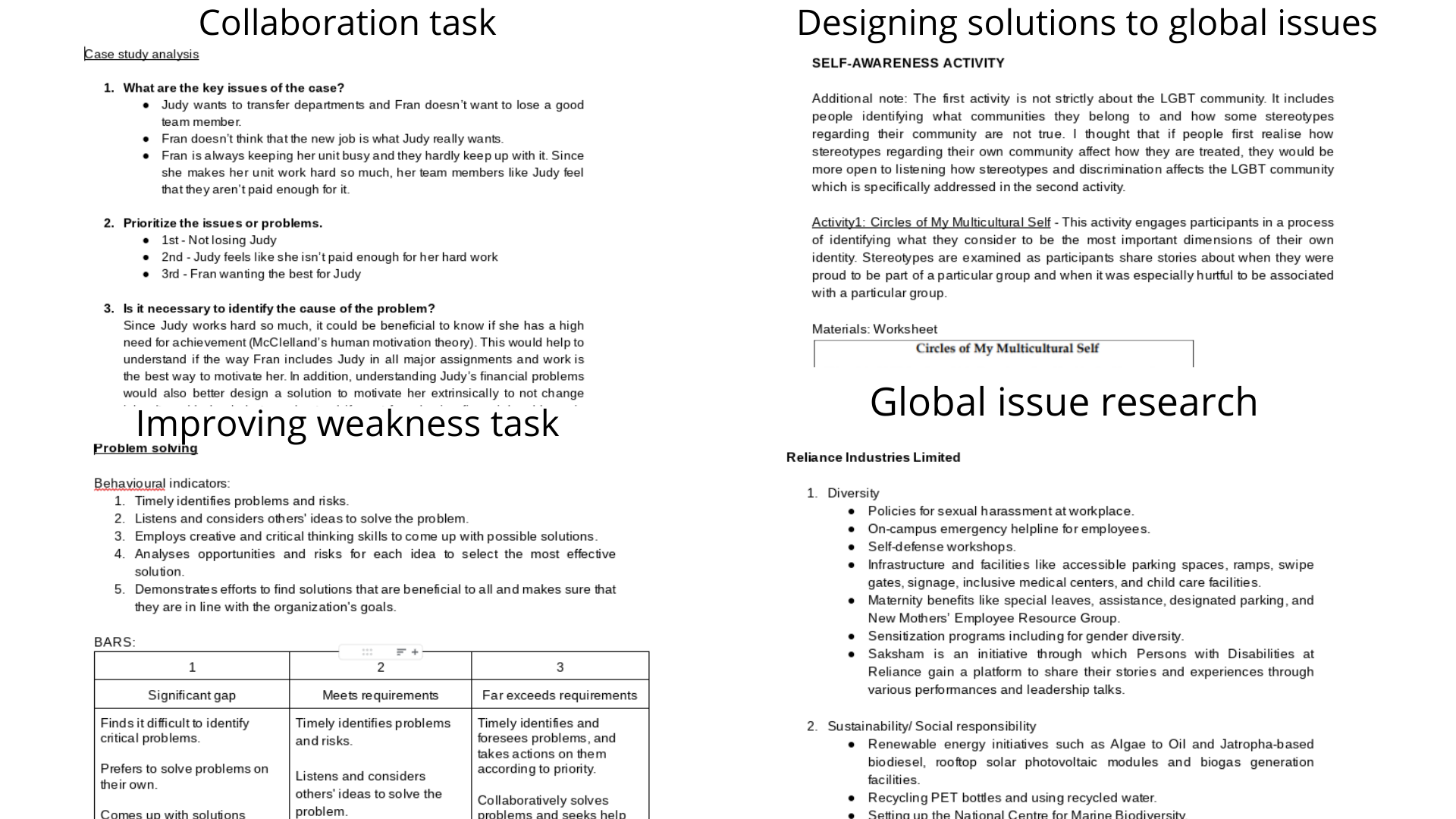I am interested in pursuing psychology as a career. Hence, to explore the different fields within psychology, I took up this internship and training course on industrial and organisational psychology. Some of the skills that I have for this experience is creativity, critical thinking and research skills. The experience I took up was an online course on organisational psychology offered by Cognizavest. I would enroll in a 60 hrs course of 1 month for the same. We would learn different concepts in organisational psychology and would be given 3 assignments a week to assess our understanding and application of concept to real life.
LO1 – Identify own strengths and develop areas for growth
The strengths that I was able to recognise through this experience was creativity and research skills. While developing learning modules and training courses (diversity, interpersonal skills, team building), I was able to effectively employ my creativity and even received positive feedback for the same. We also had research tasks which required us to research about companies’ organisational development, culture and diversity which I enjoyed and was able to do well. Being aware of these strengths gives me confidence in these skills as well as allows me to opportunity to apply these skills in different fields. The weaknesses that I could recognise was my language as I had difficulty defining different competency frameworks and designing employee selection criteria in my own words. I was able to work on this weakness extensively and improve in it because a lot of the tasks assigned included this skill.
LO2 – Demonstrate that challenges have been undertaken, developing new skills in the process
This experience was challenging as I had to learn new concepts through an online platform, which affected my attention span and limited the communication with peers and the content facilitator. However, having experience with online learning for school, I was able to employ techniques that would allow me to derive the most out of this experience. For instance, I took notes during class so that I didn’t lose attention, actively participated in virtual activities and reached out to a peer to discuss the concepts and doubts. Another challenge in this experience was time management because it required a dedication of two hours everyday which was difficult to manage with school and my other commitments. However, since I had worked on my time management skills in another CAS experience, it allowed me to employ these skills again so that I could be effective and efficient. Although sometimes I wasn’t able to manage my time such that sometimes, I couldn’t complete the daily two-hour requirements and submitted some assignments late, in the end, I improved my time management and organisation skills.
LO4 – Show commitment to and perseverance in CAS experiences
It was difficult to commit to this experience because it was very time consuming and an unfamiliar task. The commitment that this experience required was time and effort in the assignments. I was able to persevere in this experience as the facilitator was approachable and helpful. Another reason why I was able to persevere was another peer and I helped each other understand and apply the concepts. Being able to persevere in this experience gives me confidence that I would be able to persevere in my future long-term or, in some form, challenging projects.
LO5 – Demonstrate the skills and recognize the benefits of working collaboratively
Although working with others is a little difficult for me, I am generally able to do it. However, in this experience collaboration was particularly challenging because we had collaborate virtually and as my partner had exams, she couldn’t devote much time to the task. The task at hand was subjective and hence, required extensive discussions. However, to effectively complete the task, we came up with a strategy to brainstorm points of discussion before time so that our discussions were time-efficient and fruitful.
LO6 – Demonstrate engagement with issues of global significance
The curriculum included important global issues such as diversity, inclusion and mental health at workplace. I could relate these with the SDGs of good health and well being and reduced inequality that I had learnt at school. Discrimination at workplace on the account of being part of minority communities or having mental health struggles are prevalent issues globally. Learning about these global issues allowed me to become more open-minded. Through this experience, I was also able to research about real-life examples where companies had policies about diversity and mental health. Further, I was also able to design solutions to these global issues by creating sensitisation modules and activities.
